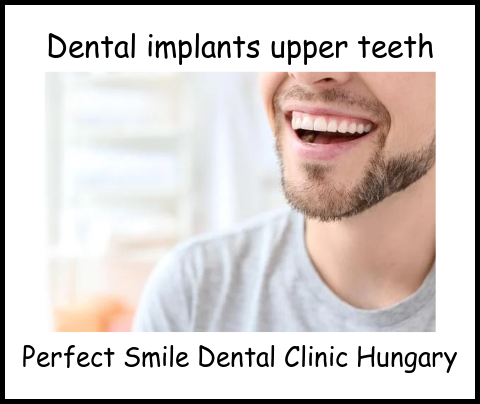Dental implants upper teeth
Dental implants upper teeth is a simple concept that needs the expertise and experience of a dental surgeon to successfully complete treatment.
This technique is commonly used by Hungarian dentists Wexford and Perfect Smile Dental Clinic Hungary to replace upper and lower teeth.
Once the implants are inserted and the crown is fixed on top the new teeth will function like natural teeth, so you can eat and smile with confidence.

Difference in where they are located
You may not be aware of this, the difference in where they are located, ie, whether it is the upper or lower jaw has a bearing on the outcome.
For example, in some ways, the difference means that some patients may not be eligible for dental implants.
Take bone loss in the upper teeth, it can be considerable, bone loss can be corrected.
By using bone augmentation techniques to place dental implants in upper teeth.
Lost all upper teeth
Patients that have lost all upper teeth have found more noticeable enjoyment from dental implants in their lives, many hated wearing a full set of dentures.
The most significant drawbacks that we hear of a full arch dentures include:
- Eating and speaking are sometimes difficult
- Full arch dentures are associated with elderly people
- People think you are much older
- Your taste buds are affected by the acrylic nature of dentures
- The chore of taking them out for cleaning every night
- They can move and cause discomfort
Getting implants for upper teeth
Getting implants for upper teeth isn’t uncommon, however the upper part of the jaw is thought to be more of a challenge when bone loss is present.
People don’t know this, but much less bone exists in the middle of a face, this means that in the first place, little bone exists above the upper jaw.
This being the case, where sparse bone is present the bone augmentation options are somewhat limited.
Specific bone grafting methods
There are specific bone grafting methods for dental implants upper teeth.
During the free xray and consultation in Hungarian dentists Wexford our dentist will know if bone loss upper mouth is too severe or not.
Sufficient bone is required for the graft (augmentation) to osseointegrate (fuse),with the existing bone.
If this isn’t possible our surgeon may use rescue implants upper mouth.
After passing through the jawbone they are screwed into the cheekbone.
Are dental implants possible with no teeth
Are dental implants possible where there are no teeth whatsoever.?
In over 95% of cases dental implants are possible where no teeth exist.
However, there are additional risks in the treatment.
For example, if a patient has had no teeth for a long time, the risks may be too great for dental implants upper teeth.
The biggest risk or drawback is the possible extensive loss of bone in patients that have lost all teeth or had them extracted.
Following tooth extraction
Following a tooth extraction the affected tooth was contributing to the daily wear and tear that teeth go through.
In addition that tooth that is extracted was stopping other teeth and bone from moving around.
This problem is exacerbated and magnified if more teeth are extracted until eventually there are no teeth.
The jawbone has no teeth support and moves around.
Because the jawbone has lost this support its possible that up to 25% of it could be lost in the first 12 months of having mo teeth.
The bone will decrease in volume and density, so not enough area to place dental implants upper teeth.

Conclusion
Fintan Duggan researched and wrote this post on dental implants upper teeth, for more information call Fintan on 0873490104.
To be clear, it is entirely possible to get dental implants for the upper mouth.
Must be aware that bone loss in that area could be an issue.
At Perfect Smile Dental Implant Centre Hungary and Hungarian Dentists Wexford we have professional experts in dental implantation.
Not only that we offer dental implants at very low prices.
Contact Fintan on 0873490104, he can help you with a free dental consultation in Wexford with Dr Heda or Dr Tamas.
They are available to share their knowledge and experience.
References
https://www.ncbi.nlm.nih.gov/pmc/articles/PMC8359846/